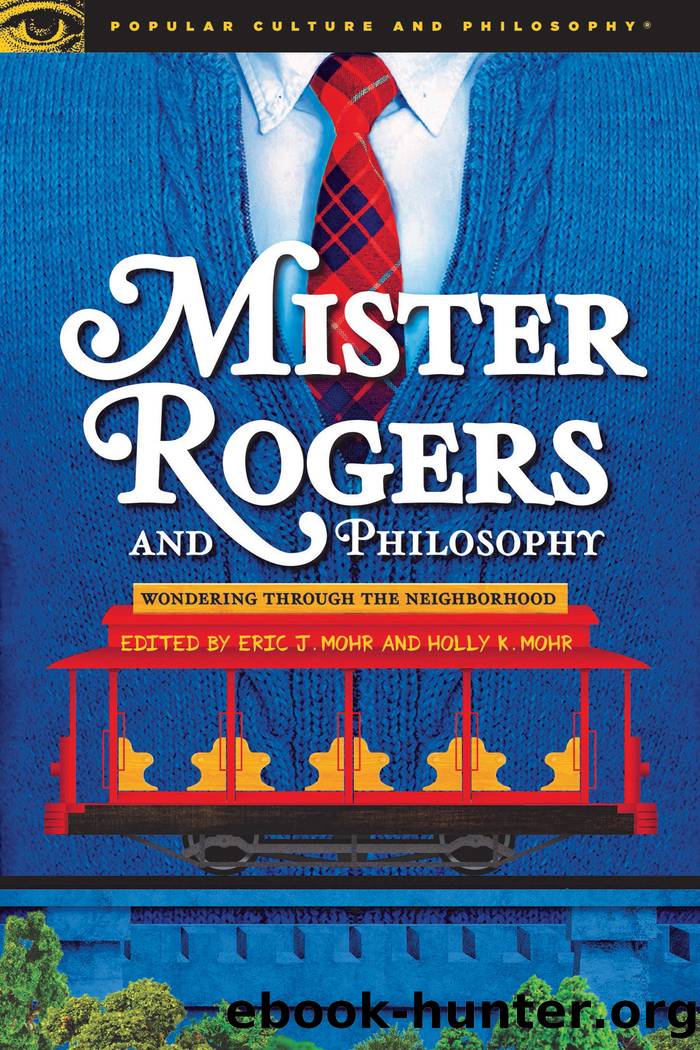Mister Rogers and Philosophy by Unknown

Author:Unknown
Language: eng
Format: epub
Publisher: Open Court
Published: 2019-08-15T00:00:00+00:00
IV
You Are My Friend, You Are Special to Me
14
A Party to Celebrate the Personal
ERIC J. MOHR
Mister Rogers begins the weekly theme âEverybodyâs Specialâ by reflecting upon his reflection in a mirror: âThereâs only one person in the whole world exactly like me,â he says, âand thereâs only one person exactly like you: nobody else but you. Each one of us is unique. Unique means one of a kind. Only one like you! Only one like me!â But, in the Neighborhood of Make-Believe, Prince Tuesday is struggling with who he is, and whether itâs merely his royalty, and specifically his royal cape, that makes him special (episode 1686).
Meanwhile, the neighborhood is preparing a surprise birthday party for Cornflake S. Pecially. Chef Brockett plans to bake him a very special (and quite unique) birthday cake with raisins and nuts in it. What better way is there to celebrate Corneyâs specialness (Corneyâs âcorny-nessâ) than by throwing a party designed just for him, by people who see how special he is?
In contrast to all of this talk about difference and specialness, thereâs also a segment that week about how ceramic plates are made. Itâs a highly mechanized process where the goal is to make sure all the plates are exactly the same. In fact, thereâs a worker whose job it is to eye the plates that come off the conveyor belt and to remove and recycle any plate that is noticeably different from the rest. What an ironic and strange juxtaposition! Whatâs valued in the factory is sameness. Whatâs valued in the neighborhood is difference.
A Rebellious Mister Rogers
The ways that things are the same, and the ways in which theyâre different has played a central role in philosophy even before Plato and Aristotle made philosophy cool. The earliest philosophers were metaphysicians, which means they thought more in terms of categories or kinds of beings, and tended to emphasize our sameness. Since all human beings are commonly human, it stands to reason that we must in some basic way all be the same.
On the insideâon the level of the âsoulââweâre all the same kind of being. Aristotle famously called us ârational animals.â But on the outsideâon the level of bodily appearanceâweâre different. Itâs our âmatterâ that individuates us, they thought. This means that you and I are distinct individuals because your body is separate and different from mine, but our âinsidesâ (to use Rogersâs phrase) are basically the same. The soul is a higher kind of being than the body, and the highest kinds of beings, in this classical metaphysical worldview, are also the most formal and universal. Aristotle even calls the soul the âformâ of the body. And while we each may live out our human lives in different ways, the way of life that is most fulfilling of our common human, rational nature has to be the one correct way to live, for everyone.
These early metaphysical considerations about a common nature and the extent that we are, and are not, different from each other (and from other kinds of living things) have their place.
Download
This site does not store any files on its server. We only index and link to content provided by other sites. Please contact the content providers to delete copyright contents if any and email us, we'll remove relevant links or contents immediately.
Robin by Dave Itzkoff(2437)
Head of Drama by Sydney Newman(2297)
I'm Judging You by Luvvie Ajayi(2202)
The Paranormal 13 (13 free books featuring witches, vampires, werewolves, mermaids, psychics, Loki, time travel and more!) by unknow(2091)
Ten by Gretchen McNeil(1884)
Single State of Mind by Andi Dorfman(1809)
#MurderTrending by Gretchen McNeil(1656)
Key to the Sacred Pattern: The Untold Story of Rennes-le-Chateau by Henry Lincoln(1626)
Merv by Merv Griffin(1610)
Most Talkative by Andy Cohen(1588)
This Is Just My Face by Gabourey Sidibe(1468)
Notes from the Upside Down by Guy Adams(1467)
The Hunger Games: Official Illustrated Movie Companion by Egan Kate(1438)
Binging with Babish by Andrew Rea(1413)
Springfield Confidential by Mike Reiss(1412)
Jamie Oliver by Stafford Hildred(1387)
The TV Writer's Workbook: A Creative Approach To Television Scripts by Ellen Sandler(1347)
Clarkson--Look Who's Back by Gwen Russell(1342)
Blue Planet II by James Honeyborne & Mark Brownlow(1282)
